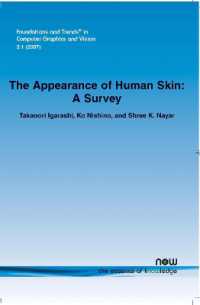Full Description
This is the first volume of a two-volume work that introduces a new and fundamentally different conception of language structure and linguistic investigation. The central claim of cognitive grammar is that grammar forms a continuum with lexicon and is fully describable in terms of symbolic units (i.e. form-meaning pairings). In contrast to current orthodoxy, the author argues that grammar is not autonomous with respect to semantics, but rather reduces to patterns for the structuring and symbolization of conceptual content.
Contents
Review and introduction Part I. Nominal Structure: 1. Nouns 2. Nominals: functional organization 3. Nominals: grounding and quantification 4. Nominal Constructions Part II. Clause Structure: 5. The auxiliary: clausal head 6. The auxiliary: grounding 7. Transitivity and grammatical relations 8. Marked clause structure 9. Ergativity and case Part III. Beyond the Clause: 10. Complex sentences 11. Further issues 12. Theoritical discussion Glossary References Index.








